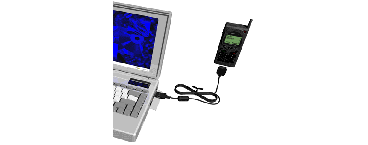Connecting your modem to an analog cellular telephone using a 3Com Megahertz cellular cable gives you freedom from land lines, enabling you to send and receive data and faxes without being tied to a physical phone line. This section explains how to use your modem's cellular functions.
3Com Megahertz modems can support certain models of Motorola, Nokia, Ericsson, AT&T, Radio Shack, and other leading cellular phones (see the 3Com Web site at www.3com.com for updated lists of supported phones).
|
NOTE: Before you can use a cellular phone with your modem, you must obtain the correct 3Com direct-connect cellular cable. If you need to order a cellular cable, go to the 3Com web site at www.3com.com to access our Parts Fulfillment Center. |
Analog cellular phones use radio frequencies for transmission and are subject to the same signal impairments as other radio devices. They do not generate dial tones or busy signals and decode touch tone or pulse dial signals. Your modem is designed to overcome this situation.
You cannot control any of the following cellular characteristics:
To ensure that your transmission quality is as high as possible, do the following:
|
CAUTION: Transmitting data or faxes from a moving vehicle may result in sub-optimal performance or loss of connection. |
With the cellular Cable ID feature, just plug in the 3Com direct-connect cellular cable and the modem recognizes the phone that you are using.
Follow these steps to connect the cables:
The phone is now ready to use.

When a cellular cable is not inserted, the modem is in landline mode. When a cellular cable is inserted, a three-tone ascending beep will sound, the message "<Manufacturer> Cable Attached" will appear (if you are in terminal mode), and the modem will automatically go into cellular mode.
If a cable is attached that the modem does not recognize, the message "Unrecognized Cable Attached" will appear if you are in terminal mode.
|
NOTE: Before you can use a cellular phone with your modem, you must obtain the correct 3Com direct-connect cellular cable. If you need to order a cellular cable,go to the 3Com web site at www.3com.com to access our Parts Fulfillment Center. NOTE: No AT command string is needed to put the modem into cellular mode. Because of the Automatic Cable Sensor feature, the initialization string is automatically sent when the cable is attached. |
When the cellular cable is removed, the message "Cable Removed" will appear if you are in terminal mode and the modem will automatically return to land line mode.
If you are not sure what cellular protocols the modem with which you are connecting supports and you are having trouble getting a good connection, set AT&N4 to limit the startup rate to 4800 bps. This setting maximizes throughput and minimizes the risk of losing the connection.
The purpose of ETC is to combat particularly harsh line conditions that can arise during cellular and rural transmissions to produce optimum cellular performance.
ETC offers the following features:
Connect to your Internet provider using a landline connection. Most Internet service providers (ISP) are not set up to support and maintain a cellular connection.
If you need to connect to an ISP with a cellular phone system, contact your local carrier to see if they provide a cellular modem pool (usually by prefixing the number you are dialing with *DATA (*3282).
If a modem pool is available, follow your carrier's instructions for connecting with the modem pool. Contact your ISP through the modem pool. If not, carefully follow the ISP procedures in "Connecting the Modem to a Cellular Phone" in this section.
|
NOTE: Cellular functions are not currently compatible with V.90. |
Cellular dialing functions work the same as landline functions (see "Dialing" in Transmitting Data).
If you are dialing manually and you do not require a personal identification number (PIN) and your phone number is 555-5555, enter:
If you are dialing manually and your cellular phone requires that you enter a PIN and your PIN is 1234, enter the phone number, three commas (you may need fewer or more commas, each representing a two-second delay), an exclamation point, three more commas, then the PIN number. For example, if your PIN number is 1234, enter:
Enter these numbers into a dialing directory the same way as they are shown above.
Cellular calls are received in the same way as landline calls. See "Receiving a Data Transmission" in Transmitting Data.